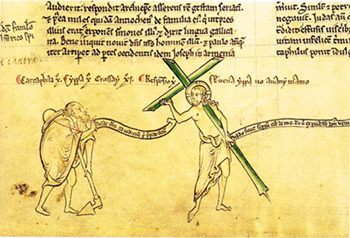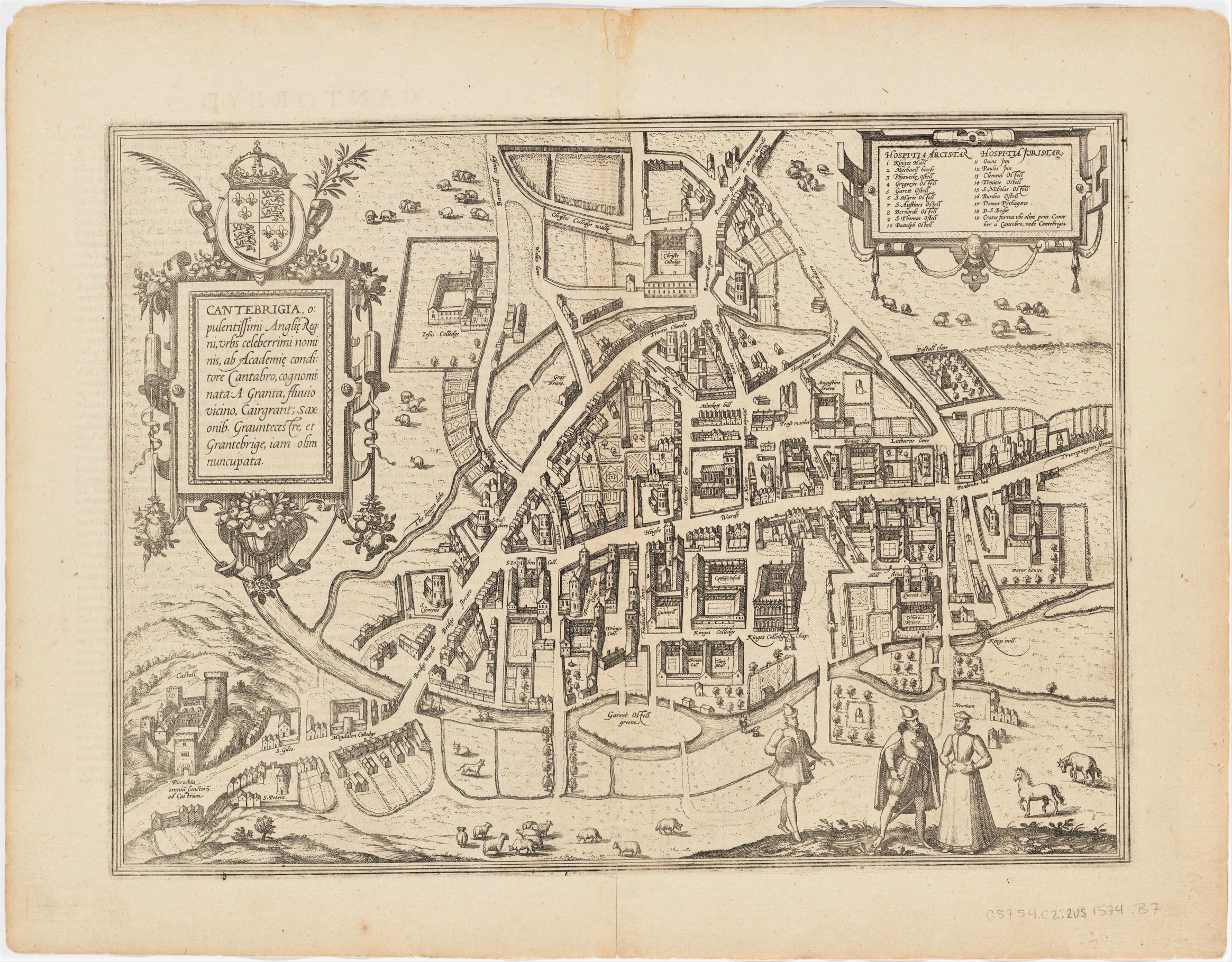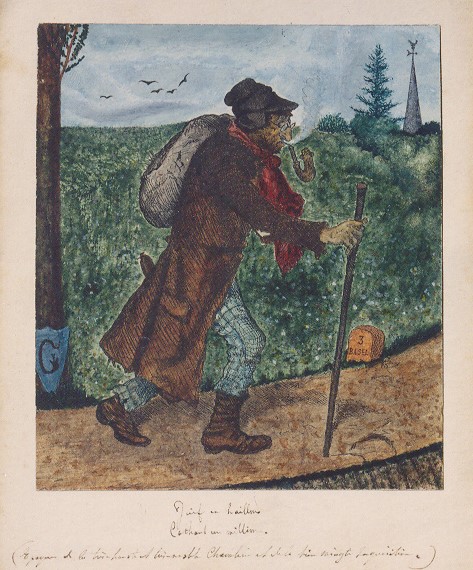|
Chronica Majora
The ''Chronica Majora'' is the seminal work of Matthew Paris, a member of the English Benedictine community of St Albans and long-celebrated historian. The work begins with Creation and contains annals down to the year of Paris' death of 1259. The ''Chronica'' has long been considered a contemporary attempt to present a universal history of the world. Written in Latin, the illustrated autograph copy of the ''Chronica Majora'' survives in three volumes. The first two parts, covering Creation up to 1188 as well as the years 1189 to 1253 (MS 26 and MS 16), are contained in the Parker Library at Corpus Christi College, Cambridge.Parker Library on the web: MS 26, MS 16I, MS 16II 362 x 244/248 mm. ff 141 + 281 The remainder of the ''Chronica'', from 1254 until Matthew's death in 1259, is in the British Library, bound as Royal MS 14 C VII folios 157–218, following Matthew's ''Historia Anglorum'' (an abridgement of the ''Chronica'' covering the period from 1070 to 1253). The ''Chro ... [...More Info...] [...Related Items...] OR: [Wikipedia] [Google] [Baidu] |
Matthew Paris Elephant From Parker MS 16 Fol 151v
Matthew may refer to: * Matthew (given name) * Matthew (surname) * Matthew (album), ''Matthew'' (album), a 2000 album by rapper Kool Keith * Matthew (elm cultivar), a cultivar of the Chinese Elm ''Ulmus parvifolia'' Christianity * Matthew the Apostle, one of the apostles of Jesus * Gospel of Matthew, a book of the Bible Ships * Matthew (1497 ship), ''Matthew'' (1497 ship), the ship sailed by John Cabot in 1497, with two 1990s replicas * MV Matthew I, MV ''Matthew I'', a suspected drug-runner List of shipwrecks in 2013#4 June, scuttled in 2013 * Interdiction of MV Matthew, Interdiction of MV ''Matthew'', a 2023 operation of the Irish military against a 2001 Panamanian cargo ship See also * Matt (given name), the diminutive form of Matthew * Mathew, alternative spelling of Matthew * Matthews (other) * Matthew effect * Tropical Storm Matthew (other) {{disambiguation ... [...More Info...] [...Related Items...] OR: [Wikipedia] [Google] [Baidu] |
Holy Land
The term "Holy Land" is used to collectively denote areas of the Southern Levant that hold great significance in the Abrahamic religions, primarily because of their association with people and events featured in the Bible. It is traditionally synonymous with what is known as the Land of Israel ( Zion) or the Promised Land in a biblical or religious context, or as Canaan or Palestine in a secular or geographic context—referring to a region that is mostly between the Mediterranean Sea and the Jordan River. Today, it chiefly overlaps with the combined territory of the modern states of Israel and Palestine. Most notable among the religions that tie substantial spiritual value to the Holy Land are Judaism, Christianity, and Islam. A considerable part of the Holy Land's importance derives from Jerusalem, which is regarded as extremely sacred in and of itself. It is the holiest city in Judaism and Christianity and the third-holiest city in Islam (behind Mecca and Medina in ... [...More Info...] [...Related Items...] OR: [Wikipedia] [Google] [Baidu] |
Felix Liebermann
Felix Liebermann (20 July 1851 – 7 October 1925) was a German historian, who is celebrated for his scholarly contributions to the study of medieval English history, particularly that of Anglo-Saxon and Anglo-Norman law. Life Felix Liebermann was born in 1851 in Berlin, then the capital of Prussia. He came from a Jewish-German family; his older brother was the painter Max Liebermann. Felix first pursued a career in banking and the textile industry, living for a time in Manchester, England. In 1873, he moved to Göttingen, Germany, to study early English history. Georg Waitz and Reinhold Pauli became his mentors. After his promotion in 1875 on the " Dialogue of the Exchequer" (), he rapidly earned a name for himself as a medievalist with a special focus on England. He served as an editor with the from 18771885. In 1896, he received honorary degrees from the universities of Oxford and Cambridge Cambridge ( ) is a List of cities in the United Kingdom, city and non-metropol ... [...More Info...] [...Related Items...] OR: [Wikipedia] [Google] [Baidu] |
Henry Richards Luard
Henry Richards Luard (25 August 1825 – 1 May 1891) was a British medieval historian and antiquary. Biography Luard was born on 25 August 1825 in London, the son of Henry Luard. His uncle was Lt.-Col. John Luard, and his cousins included Lt.-Gen. Richard George Amherst Luard and the organist Bertram Luard-Selby. He received his early education at Cheam School, Surrey. He graduated from Trinity College, Cambridge in 1847; and in 1849 was elected to a Fellowship. He entered holy orders, and served as vicar of the Church of St Mary the Great, Cambridge from 1860 to 1887. Luard Road in Cambridge is named after him. Antiquarian activities Luard was a Fellow of Trinity College, Cambridge, and of King's College London; and was Registrary of the University of Cambridge, where he worked on cataloguing the manuscripts in the Cambridge University Library. He edited 17 volumes of medieval chronicles and other texts for the Rolls Series, and was an early scholarly editor of the papers of ... [...More Info...] [...Related Items...] OR: [Wikipedia] [Google] [Baidu] |
William Wats
William is a masculine given name of Germanic origin. It became popular in England after the Norman conquest in 1066,All Things William"Meaning & Origin of the Name"/ref> and remained so throughout the Middle Ages and into the modern era. It is sometimes abbreviated "Wm." Shortened familiar versions in English include Will or Wil, Wills, Willy, Willie, Bill, Billie, and Billy. A common Irish form is Liam. Scottish diminutives include Wull, Willie or Wullie (as in Oor Wullie). Female forms include Willa, Willemina, Wilma and Wilhelmina. Etymology William is related to the German given name ''Wilhelm''. Both ultimately descend from Proto-Germanic ''*Wiljahelmaz'', with a direct cognate also in the Old Norse name ''Vilhjalmr'' and a West Germanic borrowing into Medieval Latin ''Willelmus''. The Proto-Germanic name is a compound of *''wiljô'' "will, wish, desire" and *''helmaz'' "helm, helmet".Hanks, Hardcastle and Hodges, ''Oxford Dictionary of First Names'', Oxford Univers ... [...More Info...] [...Related Items...] OR: [Wikipedia] [Google] [Baidu] |
Matthew Parker
Matthew Parker (6 August 1504 – 17 May 1575) was an English bishop. He was the Archbishop of Canterbury in the Church of England from 1559 to his death. He was also an influential theologian and arguably the co-founder (with Thomas Cranmer, a previous Archbishop of Canterbury, and the theologian Richard Hooker) of a distinctive tradition of Anglican theological thought. Parker was one of the primary architects of the Thirty-nine Articles, the defining statements of Anglican doctrine. The Parker collection of early English manuscripts, including the book of St Augustine Gospels and "Version A" of the ''Anglo-Saxon Chronicle'', was created as part of his efforts to demonstrate that the English Church was historically independent of Holy See, Rome and was one of the world's most important collections of ancient manuscripts. Along with the pioneering scholar Laurence Nowell, Lawrence Nowell, Parker's work concerning Old English literature laid the foundation for Anglo-Saxon stu ... [...More Info...] [...Related Items...] OR: [Wikipedia] [Google] [Baidu] |
Second Coming
The Second Coming (sometimes called the Second Advent or the Parousia) is the Christianity, Christian and Islam, Islamic belief that Jesus, Jesus Christ will return to Earth after his Ascension of Jesus, ascension to Heaven (Christianity), Heaven (which is said to have occurred about two thousand years ago). The idea is based on Jesus and messianic prophecy, messianic prophecies and is part of most Christian eschatologies. In Islamic eschatology, Jesus in Islam, Jesus (''ʿĪsā ibn Maryam'') is also believed to return in the end times. According to Islamic belief, he will descend from Heaven to defeat the Al-Masih ad-Dajjal, false messiah (''al-Masih ad-Dajjal''), restore justice, and reaffirm monotheism. His return is regarded as one of the Judgement Day in Islam, major signs of the Day of Judgment, and he is viewed as a revered prophet, not divine, in Islamic theology. Other faiths have various interpretations of it. Terminology Several different terms are used to refer ... [...More Info...] [...Related Items...] OR: [Wikipedia] [Google] [Baidu] |
Jesus
Jesus (AD 30 or 33), also referred to as Jesus Christ, Jesus of Nazareth, and many Names and titles of Jesus in the New Testament, other names and titles, was a 1st-century Jewish preacher and religious leader. He is the Jesus in Christianity, central figure of Christianity, the Major religious groups, world's largest religion. Most Christians consider Jesus to be the Incarnation (Christianity), incarnation of God the Son and awaited Messiah#Christianity, messiah, or Christ (title), Christ, a descendant from the Davidic line that is prophesied in the Old Testament. Virtually all modern scholars of classical antiquity, antiquity agree that Historicity of Jesus, Jesus existed historically. Accounts of Life of Jesus, Jesus's life are contained in the Gospels, especially the four canonical Gospels in the New Testament. Since the Age of Enlightenment, Enlightenment, Quest for the historical Jesus, academic research has yielded various views on the historical reliability of t ... [...More Info...] [...Related Items...] OR: [Wikipedia] [Google] [Baidu] |
Wandering Jew
The Wandering Jew (occasionally referred to as the Eternal Jew, a calque from German ) is a mythical immortal man whose legend began to spread in Europe in the 13th century. In the original legend, a Jew who taunted Jesus on the way to the Crucifixion was then cursed to walk the Earth until the Second Coming. The exact nature of the wanderer's indiscretion varies in different versions of the tale, as do aspects of his character; sometimes he is said to be a shoemaker or other tradesman, while sometimes he is the doorman at the estate of Pontius Pilate. Name An early extant manuscript containing the legend is the ''Flores Historiarum'' by Roger of Wendover, where it appears in the part for the year 1228, under the title ''Of the Jew Joseph who is still alive awaiting the last coming of Christ''. The central figure is named ''Cartaphilus'' before being baptized later by Ananias as ''Joseph''. The root of the name ''Cartaphilus'' can be divided into and , which can be translated ... [...More Info...] [...Related Items...] OR: [Wikipedia] [Google] [Baidu] |
Zid Jezis
Zid may refer to: * Degtyarev Plant, abbreviated ЗиД (ZiD) * Indianapolis Air Route Traffic Control Center, abbreviated ZID * Zid, alternate name of Barmazid-e Sofla, a village in South Khorasan Province, Iran * Zeyd, South Khorasan, a village in South Khorasan Province, Iran * ''Zid'' (1976 film), a 1976 Indian Hindi-language romance film by Vijay, starring Sachin Pilgaonkar and Sarika * ''Zid'' (1994 film), a 1994 Indian Hindi-language romantic drama film, starting Jay Mehta and Raageshwari * ''Zid'' (2014 film), a 2014 Indian Hindi-language erotic-thriller film by Vivek Agnihotri * ''Zid'' (TV series), on Hum TV a 2014 Pakistani TV Series * ''Zid'' (TV series) on Express Entertainment, a 2014 Pakistani TV Series See also * Ziddi (other) * Zeyd (other) Zeyd may refer to: * Zeyid, Azerbaijan * Zeyd, Ilam, Iran * Bala Zeyd, Mazandaran Province, Iran * Pain Zeyd, Mazandaran Province, Iran * Zeyd, South Khorasan, Iran See also *Zaid (other) {{geod ... [...More Info...] [...Related Items...] OR: [Wikipedia] [Google] [Baidu] |
Cicero
Marcus Tullius Cicero ( ; ; 3 January 106 BC – 7 December 43 BC) was a Roman statesman, lawyer, scholar, philosopher, orator, writer and Academic skeptic, who tried to uphold optimate principles during the political crises that led to the establishment of the Roman Empire. His extensive writings include treatises on rhetoric, philosophy and politics. He is considered one of Rome's greatest orators and prose stylists and the innovator of what became known as "Ciceronian rhetoric". Cicero was educated in Rome and in Greece. He came from a wealthy municipal family of the Roman equestrian order, and served as consul in 63 BC. He greatly influenced both ancient and modern reception of the Latin language. A substantial part of his work has survived, and he was admired by both ancient and modern authors alike. Cicero adapted the arguments of the chief schools of Hellenistic philosophy in Latin and coined a large portion of Latin philosophical vocabulary via ... [...More Info...] [...Related Items...] OR: [Wikipedia] [Google] [Baidu] |






